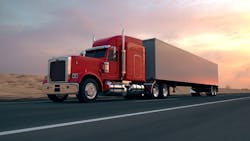EPA Strengthens Greenhouse-Gas Efficiency Goals for Big Rigs
The U.S. Environmental Protection Agency, resisting lobbying from the trucking industry, unveiled tough new regulations to reduce carbon emissions from tractor-trailers and other long-haul trucks in support of a key policy goal of President Barack Obama’s administration.
The EPA and the U.S. Transportation Department on Tuesday issued regulations that require trucks become more efficient through 2027. The final rules achieve 10% more carbon emission and fuel-consumption reductions than last year’s proposed rules, likely raising the price tag price for such vehicles but cutting operating costs. A big part of the greenhouse-gas reductions are expected to come from engine improvements, cutting fuel consumption by up to 5%, benefiting companies like Cummins Inc. (IW 500/59).
“We expect this will drive innovation as well as clear the air that we breathe,” EPA Administrator Gina McCarthy said on a call with reporters Tuesday. “These standards are ambitious but achievable.”
Cummins has been a supporter of the EPA rules, in part because they will drive the market for advanced technologies, like a system it’s developing to use excessive heat produced by working engines to run electric motors.
The regulations “provide a long-term road map to make sure we develop the technology we’ll need in the marketplace,” said Brian Mormino, executive director of environmental strategy and compliance at the Columbus, Indiana-based engine maker. “That’s a positive for us.”
Environmental groups were pushing the EPA to go beyond the proposal the agency released last year, which reduced carbon emissions 36% off a 2010 baseline by 2027. The Union of Concerned Scientists said a 40% reduction was possible based on an analysis of trucking technology.
Tractor Price Tag Could Rise 12%
The cost of tractors that pull freight trailers could rise 12%, according to Bloomberg Government. This will impact truckmakers such as Paccar Inc., Navistar International Corp., Daimler AG and Volvo AB, raising costs for their products. Companies with big private fleets, like FedEx Corp. and PepsiCo Inc., will likely benefit through lower fuel costs.
The adoption of fuel-efficiency technologies will grow significantly in coming years, Stifel Nicolaus & Co.’s Transportation and Logistics Research Group analyst Michael Baudendistel said in a note published Tuesday. WABCO Holdings Inc. would be one of the clear beneficiaries as more companies adopt its trailer skirts, tire pressure monitoring systems and predictive cruise control, he said.
Even with cheaper diesel prices, fuel is one of the top operating expenses for trucking companies, the American Trucking Associations said in a statement Tuesday. Regulators responded to many of the industry’s concerns on lead time, creating one set of national standards and providing flexibility, it said.
“While the potential for real cost savings and environmental benefits under this rule are there, fleets will ultimately determine the success or failure of this rule based on their comfort level purchasing these new technologies,” said Glen Kedzie, the Arlington, Virginia-based trade group’s vice president and energy and environmental counsel.
Truckers can have the biggest influence on fuel economy with proper training, said Norita Taylor, a spokeswoman for the Owner-Operator Independent Drivers Association.
“Forcing a standard which can lead to problems with reliability and maintenance ultimately has no benefits to the environment if no one wants to buy the product,” Taylor said.
The regulations will mitigate the effects of climate change, reduce U.S. reliance on foreign oil and save both truckers and consumers money, according to Fred Krupp, president of the Environmental Defense Fund.
“Strong, protective clean-truck standards will be a gold-medal win against climate change,” Krupp said. “Freight trucks use almost 120 million gallons of fuel every day, and emit hundreds of millions of metric tons of climate pollution each year.”
By Jeff Plungis and John Lippert
About the Author
Bloomberg
Licensed content from Bloomberg, copyright 2016.
